Beneficial Effects on Energy, Atherosclerosis and Aging
By Ward Dean, MD and Jim English
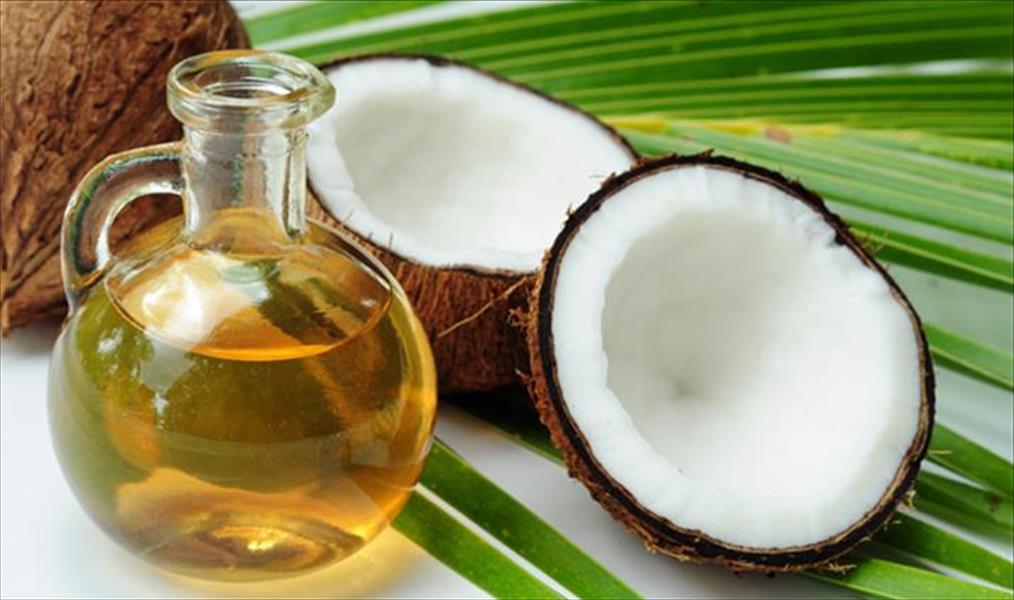 Medium Chain Triglycerides (MCTs) are a unique form of dietary fat that impart a wide range of positive health benefits. Nevertheless, the potential anti-aging properties of MCTs have been largely unrecognized by many life extension enthusiasts. Dietary fats are molecules composed of individual carbon atoms linked into chains ranging from 2 to 22 carbon atoms in length. Long Chain Fatty acids (LCTs) ranging from 12 to 18 carbons long are the predominant form of fat in the American diet. MCTs, by contrast, are composed of only 6 to 10 carbon links. Because of their shorter chain length, MCTs have a number of unique properties which give them advantages over the more common LCTs.
Medium Chain Triglycerides (MCTs) are a unique form of dietary fat that impart a wide range of positive health benefits. Nevertheless, the potential anti-aging properties of MCTs have been largely unrecognized by many life extension enthusiasts. Dietary fats are molecules composed of individual carbon atoms linked into chains ranging from 2 to 22 carbon atoms in length. Long Chain Fatty acids (LCTs) ranging from 12 to 18 carbons long are the predominant form of fat in the American diet. MCTs, by contrast, are composed of only 6 to 10 carbon links. Because of their shorter chain length, MCTs have a number of unique properties which give them advantages over the more common LCTs.
Until the early 1980s, MCTs were predominantly available only as a constituent of butter, coconut oil, and other natural sources. However, Dr. Vigen K. Babayan of the Nutrition Laboratory, Harvard University, developed a process to produce them in large quantities, to be used primarily for therapeutic uses in a number of conditions. (1)
 MCTs, Energy and Exercise
MCTs, Energy and Exercise
MCTs provide about ten percent fewer calories than LCTs – 8.3 calories per gram for MCTs versus 9 calories per gram for LCTs. But this is just one of the unique advantages of MCTs. (2) More importantly, reduced chain length also means that MCTs are more rapidly absorbed by the body and more quickly metabolized (burned) as fuel (Fig. 1). The result of this accelerated metabolic conversion is that instead of being stored as fat, the calories contained in MCTs are very efficiently converted into fuel for immediate use by organs and muscles.
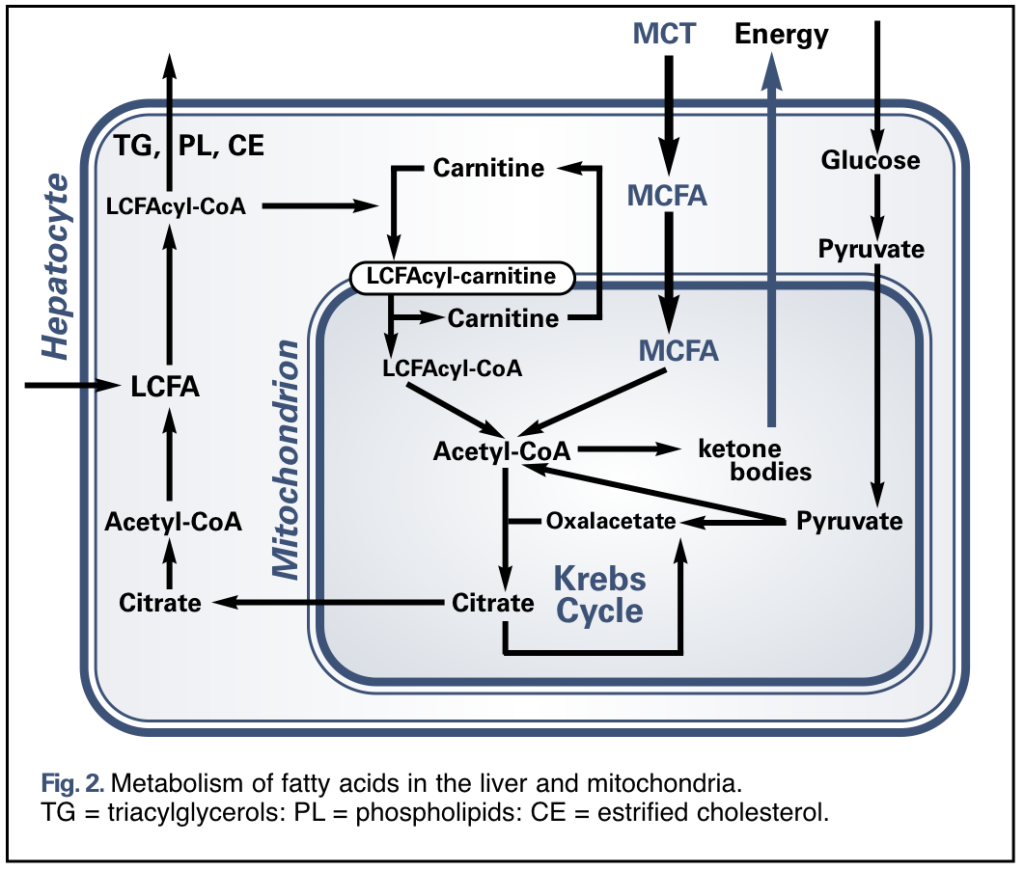 The energy-enhancing properties of MCTs are attributed to the fact that they cross the double mitochondrial membrane very rapidly, and do not require the presence of carnitine, as do LCTs (Fig. 2). The result is an excess of acetyl-coA, which then follows various metabolic pathways, both in the mitochondria (Krebs Cycle) and in the cytosol, resulting in the production of ketones. Scientists attribute the increased energy from consumption of MCTs to the rapid formation of ketone bodies. MCTs are thus a good choice for anyone who has increased energy needs, as following major surgery, during normal or stunted growth, to enhance athletic performance, and to counteract the decreased energy production that results from aging.
The energy-enhancing properties of MCTs are attributed to the fact that they cross the double mitochondrial membrane very rapidly, and do not require the presence of carnitine, as do LCTs (Fig. 2). The result is an excess of acetyl-coA, which then follows various metabolic pathways, both in the mitochondria (Krebs Cycle) and in the cytosol, resulting in the production of ketones. Scientists attribute the increased energy from consumption of MCTs to the rapid formation of ketone bodies. MCTs are thus a good choice for anyone who has increased energy needs, as following major surgery, during normal or stunted growth, to enhance athletic performance, and to counteract the decreased energy production that results from aging.
In recent years MCTs have gained in popularity with athletes seeking to increase energy levels and enhance endurance during high-intensity exercise, as well as serving as an alternative energy source for athletes on high-protein, low-carbohydrate diets. Researchers have previously shown that MCTs can increase physical endurance in animal studies. In swimming capacity tests, mice fed a diet containing MCTs outperformed mice fed a diet containing LCTs. (3) The researchers noted that the muscles of mice fed the MCTs produced higher levels of key metabolic enzymes (3-oxo acid CoA-transferase, citrate synthase and malate dehydrogenase) involved in the Krebs cycle (tricarboxylic acid cycle), the body’s primary energy production mechanism. MCT-fed mice also burned fat at a higher rate to enhance cellular energy production.
MCTs and Weight Control
In addition to their lower caloric content than LCTs, MCTs are not stored in fat deposits in the body as much as LCTs. (2) Furthermore, MCTs have been shown to enhance thermogenesis (i.e., fat burning). (4) So MCTs seem to offer a triple approach to weight loss – they (1) have a lower calorie content than other fats, (2) are minimally stored as fat, and (3) contribute to enhanced metabolism to burn even more calories. This third property may be due to the fact that MCTs behave metabolically in some fashion similar to carbohydrates, as well as their promoting the development of ketones, as mentioned above. (5) Ketone production is a cornerstone of the Atkins Diet, and MCTs may enable those following the Atkins’ program to more rapidly obtain benefits and more easily adhere to the program. Ketones are also one of the two substances which the brain can utilize for energy (glucose, being the other). Dr. Hans Kaunitz speculated that for this reason, MCTs might be advantageous for the aging brain. (6)
Kaunitz and colleagues performed a study on rats, to compare the effects of diets in which the fat was provided by MCTs or lard. The MCT-fed rats lost significant weight, although their calorie consumption was the same as the lard-fed rats. In addition, Kaunitz described the MCT-fed rats as having “an excellent survival rate.” In another study, researchers observed decreased weight gains, reduced fat content, and unchanged whole-body protein content in MCT-fed animals compared to control animals fed LCTs. In a third study, fat deposits in rats fed diets high in MCTs were 23 percent less than in LCT-fed rats.
Animal results have been supported by human trials. In one study researchers fed six lean and six obese young males meals containing either long-chain triglycerides (LCTs) or MCTs plus LCTs. In both the lean and obese individuals, post-meal thermogenesis (fat burning) was enhanced after consuming meals containing MCTs. 7In another study involving a group of obese women on a restricted diet researchers noted that insulin profiles improved when MCTs comprised 24 percent of total consumed calories. (8)
Calorie-restricted diets are often associated with marked declines in energy. A number of studies support the benefits of using MCTs in weight loss programs to boost energy levels and increase fatty acid metabolism to aid in reducing fat deposits. In one study when researchers in Czechoslovakia treated 60 obese patients with MCT oil they concluded that MCTs offered a number of benefits, stating, “Administration of… medium-chain fatty acids can…improve the long-term success of diet therapy of obese patients.” (9)
Appetite Control
MCTs have been shown to suppress appetite, an ability of obvious benefit for those attempting to lower their intake of total calories. In one 14-day study, six healthy male volunteers were allowed unlimited access to one of three diets: a low MCT diet, a medium MCT diet, and a high MCT diet. Caloric consumption was significantly lower on the high MCT diet. The researchers noted that substituting MCTs for other fats in a high-fat diet “can limit the excess energy intakes and weight gain produced by high-fat, energy-dense diets.” (10)
 MCTs and Atherosclerosis
MCTs and Atherosclerosis
MCTs have a number of properties that may be beneficial in preventing atherosclerosis. Among these are that MCTs have anti-coagulation effects, and have been shown to lower serum cholesterol in rats 11 and calves (Fig. 3). (12) In addition, MCTs reduce levels of cholesterol in the liver and other tissues. (5,13) MCTs have also been reported to act as antioxidants and reduce tissue requirements for Vitamin E. (6)
MCTs have a slight hypoglycemic (blood glucose-lowering) effect, and thus may be useful for diabetics, or anyone with a tendency for pre-diabetes (which includes just about everyone over 35). It may be the combination of the glucose and lipid-lowering effects of MCTs that resulted in Kaunitz’ report that “the life span [of experimental animals] is longer when the diet is richer in MCTs than LCTs.”
Finally, another testimony to the benefit of MCTs in preventing atherosclerosis and cardiovascular disease is the country of Sri Lanka. In the 1978 Demographic Yearbook of the United Nations, the causes of death in many countries were reported. Sri Lanka reported a death rate due to ischemic heart disease of 1 per 1,000,000. The figures for most countries varied from 38.4 to 187.7. It is significant that the predominant dietary fat in Sri Lanka is coconut oil, which contains over 50 percent MCTs.
MCTs and Immune Enhancement
To evaluate the immune-normalizing properties of MCTs, Kaunitz and colleagues injected rats with rabbit immune serum, known to cause severe autoimmune kidney disease in the rats. They then administered MCT in the diet, and noted that the pathological changes in the kidneys were much reduced in the MCT-treated group. Kaunitz speculated that MCTs could thus have a positive effect “on autoimmune reactions characteristic of the aging process.”
MCTs and Medicine
MCTs have proven useful in treating a number of medical disorders that involve impaired or damaged lipid (fat) metabolism. These include: obstructive jaundice, biliary cirrhosis, pancreatitis, cystic fibrosis, celiac disease, Whipple’s disease, Crohn’s disease, regional enteritis, and malabsorption in neonates. MCT has been reported to be useful for feeding of newborn infants, to both assist their initial growth and to contribute to their physiological development. The absorption of calcium and magnesium appears to be enhanced when the diet contains MCTs, particularly in infants, and the absorption of amino acids also appears to be improved. Thus, MCTs can be a useful addition to the diet of those suffering from any form of malnutrition or tissue wasting. In this regard, MCTs are often added to parenteral formulas for intravenous feeding following surgery or during recovery from severe injuries, burns and infections.
Conclusion
The major adverse effect that is noted by beginning users of MCTs is nausea and gastric discomfort. This can be minimized or eliminated by starting with very small doses (i.e., about 1/4 teaspoon several times daily), and increasing the dose as tolerated. Before long, MCT can be taken by the tablespoonful. MCT oil can be used as a salad dressing, and as a cooking oil. However, MCT should not be heated to temperatures above 150-160 degrees C, because it will oxidize and breakdown, adversely affecting the taste. With those few caveats, MCTs are an especially beneficial supplement for fueling physical exertion, given their high energy density content, rapid rate of absorption and quick metabolic conversion into cellular energy. Additionally MCTs can be quickly mobilized in the post-exercise recovery phase to rebuild muscles and prevent the breakdown of proteins (catabolism) that can occur when the body is putting a maximum demand on the body’s energy reserves.
References
1. Babayan, V.K. Medium chain fatty acid esters and their medical and nutritional applications. J Am Oil Chem Soc, 1981, 58: 49A-51A.
2. Kaunitz, H. Dietary use of MCT in “Bilanzierte Ernaehrung in der Therapie,” K. Lang, W. Fekl, and G. Berg, eds. George Thieme Verlag, Stuttgart, 1971.
3. Fushiki T, Matsumoto K, Inoue K, Kawada T, Sugimoto E. Swimming endurance capacity of mice is increased by chronic consumption of medium-chain triglycerides. J Nutr 1995 Mar;125(3):531-9.
4. Baba, N., Bracco, E.F., Seylar, J., Hashim, S.A. Enhanced thermogenesis and diminished deposition of fat in response to overfeeding with diets containing medium chain triglycerides. J Am Soc Clin Nutrition, 1981, 34: 624.
5. Bach, A.C., and Babayan, V.K. Medium-chain triglycerides: An update. Am J Clin Nutr, 1982, 36: 950-962.
6. Kaunitz, H., Slanetz, C.A., Johnson, R.E., Babayan, V.K., Garsky, G. Nutritional properties of the triglycerides of medium chain-length. J Am Oil Chem Soc, 1958, 35: 10-13.
7. Scalfi L, Coltorti A, Contaldo F. Postprandial thermogenesis in lean and obese subjects after meals supplemented with medium-chain and long-chain triglycerides. Am J Clin Nutr 1991 May;53(5):1130-3.
8. 6. Yost TJ, Eckel RH. Hypocaloric feeding in obese women: metabolic effects of medium-chain triglyceride substitution. Am J Clin Nutr 1989 Feb;49(2):326-30.
9. Hainer V, Kunesova M, Stich V, Zak A, Parizkova J. The role of oils containing triacylglycerols and medium-chain fatty acids in the dietary treatment of obesity. The effect on resting energy expenditure and serum lipids. Cas Lek Cesk 1994 Jun 13;133(12):373-5.
10. Stubbs RJ, Harbron CG. Covert manipulation of the ratio of medium- to long-chain triglycerides in isoenergetically dense diets: effect on food intake in ad libitum feeding men. Int J Obes Relat Metab Disord 1996 May;20(5):435-44.
11. Kaunitz, H., Slanetz, C.A., Johnson, R.E., Babayan, V.K. Interrelations of linoleic acid with medium chain and long chain saturated triglycerides. J Am Oil Chem Soc, 1959, 36: 322-325.
12. Stewart, J.W., Wiggers, K.D., Jacobsen, N.L., Berger, P.J. Effect of various triglycerides on blood and tissue cholesterol of calves, J Nutr, 1978, 108: 561-566.
13. Kaunitz, H. Medium Chain Triglycerides in Aging and Atherosclerosis, in: Advances in Human Nutrition, Vol 3, by J. Kabara (ed), Chem-Orbital, POB 134, Park Forest, IL 60466.











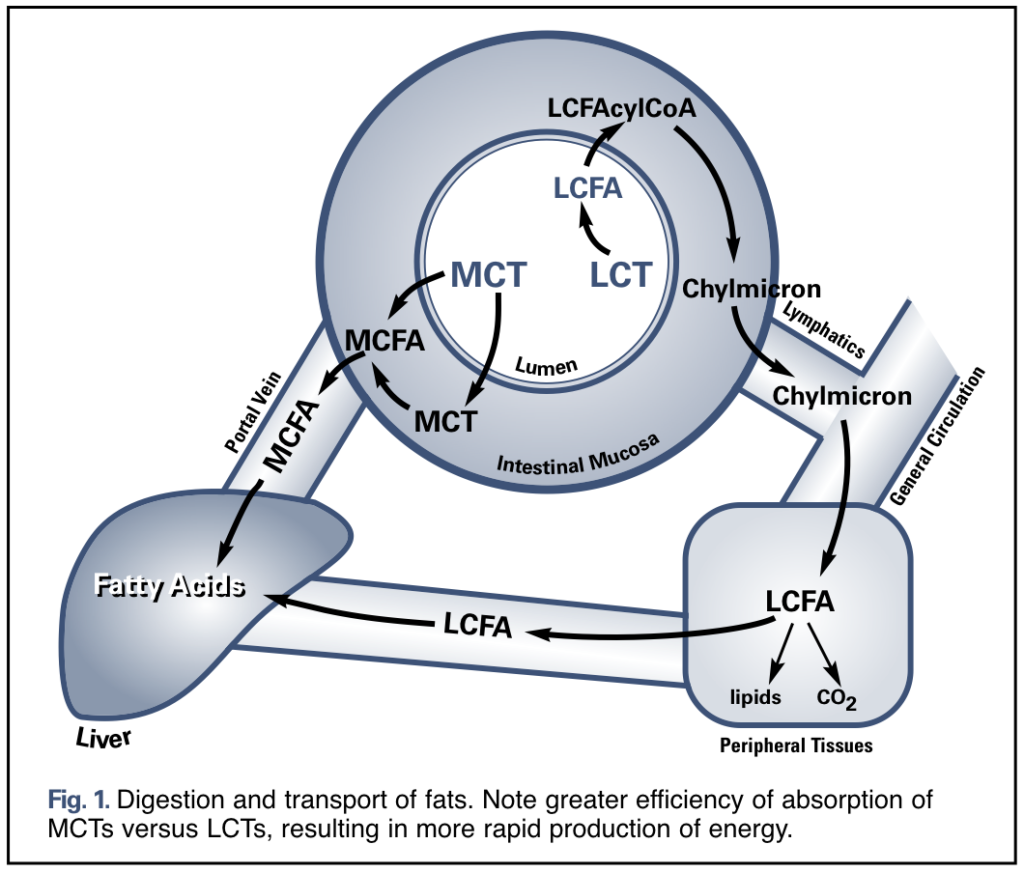
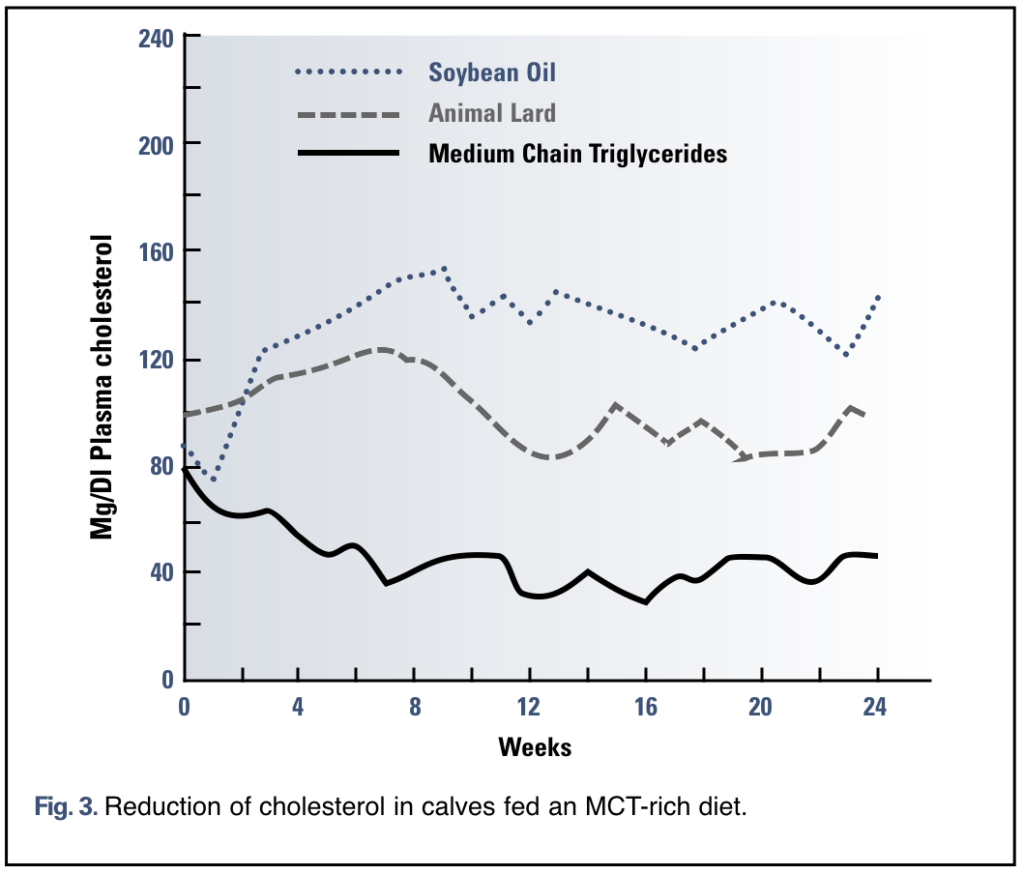
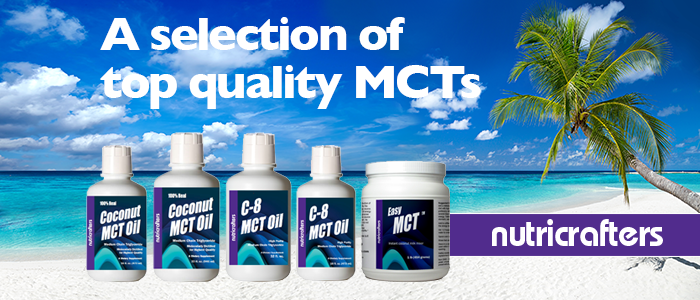

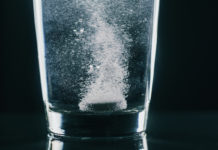


[…] Coconuts are loaded with fiber and powerful fatty acids called medium-chain triglycerides. […]
[…] [1] Nutrition Review […]
[…] 1) NutritonReview.org. (2016, June 20). Medium Chain Triglycerides (MCTs) | Nutrition Review. Retrieved from https://nutritionreview.org/2013/04/medium-chain-triglycerides-mcts/ […]
[…] contrast with long-chain fatty acids which are regarded as less healthy, MCTs can actively promote your well-being. Of course, the key here is […]
[…] In contrast with long-chain fatty acids which are regarded as less healthy, MCTs can actively promote your well-being. […]
[…] On top of this, the fats found in junk foods are usually long chain tryglicerides (LCTs) The body isn’t very good at converting these into energy. By contrast, the medium chain triglycerides (MCTs) which are found in healthy sources of fat don’t have as many calories per weight. However, the body converts these healthy fats into energy much faster and efficiently. (1, 2) […]
[…] meal replacement contains MCT’s that aid in metabolism by providing energy that is required for our bodies to perform various […]
[…] larga. Tambíen, reemplazar los ácidos grasos de cadena larga por los MCT tiende a resultar en mayor sensación de llenura y menos consumo de […]
[…] Medium-chain triglycerides (or MCTs) are fats that contain a few fatty acid tails of 6-12 carbon atoms in length. MCTs have shown many benefits to human health. […]
[…] que los LCT, o 8.4 calorías por gramo para los MCT frente a 9.2 calorías por gramo para los LCT ( 11 […]
[…] Dean W y col. (2013) Triglicéridos de cadena media (MCT). nutritionreview.org/2013/04/medium-chain-triglycerides-mcts/ […]
[…] Dean W. (2013). Triglicéridos de cadena media. nutritionreview.org/2013/04/medium-chain-triglycerides-mcts/ […]
[…] 10. The image and write-up everyone always references, but isn’t detailed enough, is at https://nutritionreview.org/2013/04/medium-chain-triglycerides-mcts/ […]
[…] que los LCT, o 8.4 calorías por gramo para los MCT frente a 9.2 calorías por gramo para los LCT ( 11 […]
[…] Coconut oil: An amazing source of medium-chain triglycerides (MCTs), which create ketone bodies and improve brain function. (Think bulletproof coffee). MCTs are easily absorbed by the body and converted into energy. […]
[…] ocení, že MCT olej lze využít jako okamžitý a velmi dobrý zdroj energie pro tělo a mozek zároveň na rozdíl od tradičních olejů, jejichž konzumace spíše unavuje a […]
[…] In terms of weight reduction, the association arises mainly because coconut oil is high in medium chain triglycerides (MCTs). These fatty acids oxidize rapidly in the liver and do not tend to accumulate as body fat. More calories are burned by metabolizing MCTs than long chain fatty acids. Also, replacing long chain fatty acids with MCTs tends to result in a greater feeling of fullness and less calorie intake. […]
[…] way to long-chain triglycerides (LCTs). Whereas there’s analysis exhibiting that MCTs enhance thermogenesis (fats burning) and appetite control, the MCT oil utilized in most analysis has a different fatty […]
[…] differently to long-chain triglycerides (LCTs). While there is research showing that MCTs increase thermogenesis (fat burning) and appetite control, the MCT oil used in most research has a different fatty acid […]
[…] Medium Chain Triglycerides (MCTs). Nutrition Review. Updated 2013. Accessed 15 Jan 2020. […]
[…] Medium Chain Triglycerides (MCTs). Nutrition Review. Updated 2013. Accessed 15 Jan 2020. […]
[…] MCTs, um tipo de gordura saturada que foi associada à redução do colesterol no sangue (2). Além disso, devido ao seu alto teor de gordura, seu cozimento não sofrerá nenhuma perda de […]
[…] carbon chain means that your body will more readily burn, rather than store, the fat in MCTs, converting it into fuel for use by the organs and muscles while also boosting your metabolism. Further, MCTs have a lower calorie content than other fats, […]
[…] Dietary Fats and Cardiovascular Disease, A presidential Advisory From the American Heart Association Staying healthy with nutrition, Elson M. Haas, MD 21st– century edition http://articles.mercola.com/sites/articles/archive/2010/10/22/coconut-oil-and-saturated-fats-can-make-you-healthy.aspx https://www.ncbi.nlm.nih.gov/pubmed/17570262 https://www.ncbi.nlm.nih.gov/pubmed/10348498 https://www.ncbi.nlm.nih.gov/pubmed/11033985 https://nutritionreview.org/2013/04/medium-chain-triglycerides-mcts/ […]
fantastic article! We use coconut oil in our dog treats! Love the health benefits for dogs too!
[…] medium chain triglyceride fats in coconut kernel assistance to trim back in addition to regulate insulin surges inward the torso, […]
[…] functions inward the trunk. Most of the fat inwards coconut flour consists of medium-chain triglycerides, which are digested easily inwards your arrangement, too accept antiviral, antimicrobial and […]
[…] many creamy fats equally kokosnoot milk. Coconut milk also contains MCTs, a type of saturated fatty that has been linked to lower blood cholesterol. Also, because of its high-fat content, your baking volition non […]
[…] This was supported by researchers that stated consuming MCT oil causes energy burning and ketone production in the body. It is weight and appetite control. […]
[…] Nutrition Review: Medium Chain Triglycerides: Beneficial Effects on Energy, Atherosclerosis and Agi… […]
[…] Nutrition Review: Medium Chain Triglycerides (MCTs) […]
Thank You so much for this information..
[…] Medium-chain triglycerides do not accumulate as fat in your body. How is this possible? This is because of their chain length. They are digested and metabolized so quickly that the body uses them immediately as opposed to storing them. LCTs, on the other hand, take longer to digest, and will have to pass through the lymph and blood before they get to the liver. By the time LCTs get to the liver, other energy sources such as sugar and MCTs are already being used to fuel the cells. The body then stores the LCTs as fat. […]
[…] empezar, los MCT proporcionan aproximadamente un 10% menos de calorías que los LCT (triglicéridos de cadena larga). Además de eso, los MCT no se almacenan en depósitos […]
[…] Ketoner är ett av två ämnen som hjärnan kan använda för energi (glukos är det andra) (2). (text lånad från […]
[…] Photo: Nutrition Review – MCT Beneficial Effects […]
[…] It’s said that there are around 8.3 calories per gram of MCT and nine calories per gram of LCT. (4) […]
[…] saturated fats in coconut oil are believed to be an energy booster for your body. The medium-chain triglycerides that are found in coconut oil have a reduced length, and this allows them to be absorbed more […]
[…] saturated fats in coconut oil are believed to be an energy booster for your body. The medium-chain triglycerides that are found in coconut oil have a reduced length, and this allows them to be absorbed more […]
[…] stand for medium-chain triglycerides, and they are fats that can help ketone production (coconut oil contains MCTs and that’s why […]
[…] En la década de 1980, el Dr. Vigen K. Babayan, del Laboratorio de Nutrición de la Universidad de Harvard, ideó una técnica para aislar y crear aceite MCT puro [1]. […]
[…] En la década de 1980, el Dr. Vigen K. Babayan, del Laboratorio de Nutrición de la Universidad de Harvard, ideó una técnica para aislar y crear aceite MCT puro [1]. […]
[…] heavier in long chain fatty acids, like olive oil, soybean oil, or avocado oil. When your cells use MCTs instead of glucose for fuel, the body’s metabolism is boosted for up to 24 hours.And speaking of MCTs… […]
[…] als LCTs oder 8,4 Kalorien pro Gramm für MCTs gegenüber 9,2 Kalorien pro Gramm für LCTs ( 10 […]
[…] que les LCT, ou 8,4 calories par gramme pour les MCT contre 9,2 calories par gramme pour les LCT ( 10 […]
[…] oil, combined with the way they are metabolized, might have an interesting effect on hunger. In a 14-day study, six males were allowed unlimited consumption of one of three diets: a low MCT diet, a medium MCT […]
[…] hơn và hiệu quả hơn chất béo trong chế độ ăn uống truyền thống. ( 10 ) Nếu các xét nghiệm của bác sĩ xác định tình trạng kém hấp thu chất […]
[…] “Medium Chain Triglycerides (MCTs) Beneficial Effects on Energy, Atherosclerosis, and Aging,” Nutrition Review, accessed November 29, […]
[…] “Medium Chain Triglycerides (MCTs) Beneficial Effects on Energy, Atherosclerosis, and Aging,” Diet Evaluate, accessed November 29, […]
[…] 1) NutritonReview.org. (2016, June 20). Medium Chain Triglycerides (MCTs) | Nutrition Review. Retrieved from https://nutritionreview.org/2013/04/medium-chain-triglycerides-mcts/ […]